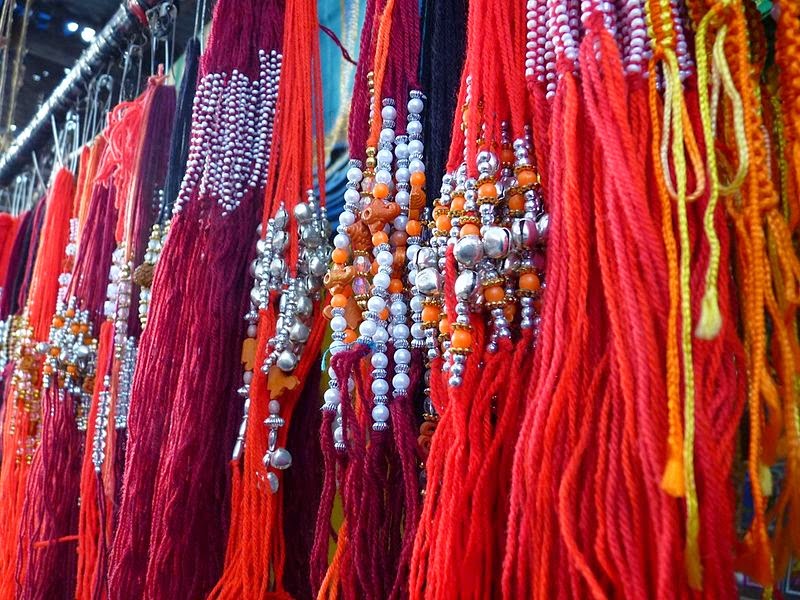The chaste bond of love between a brother and a sister is
one of the deepest and noblest of human emotions. 'Raksha Bandhan' or 'Rakhi'
is a special occasion to celebrate this emotional bonding by tying a holy
thread around the wrist. This thread, which pulsates with sisterly love and
sublime sentiments, is rightly called the ‘Rakhi’. It means 'a bond of
protection', and Raksha Bandhan signifies that the strong must protect the weak from all that’s evil.
The
ritual is observed on the full moon day of the Hindi
month of Shravan, on
which sisters tie the sacred Rakhi string on their brothers' right wrists, and pray,
for their long life. Rakhis are ideally made of silk with gold and silver
threads, beautifully crafted embroidered sequins, and studded with semi
precious stones.
The
Social Binding
This ritual not only strengthens the bond of love between
brothers and sisters, but also transcends the confines of the family. When a
Rakhi is tied on the wrists of close friends and neighbors, it underscores the
need for a harmonious social life, where every individual co-exist peacefully
as brothers and sisters. All members of the community commit to protect each
other and the society in such congregational Rakhi Utsavs, popularized by the
Nobel laureate Bengali poet Rabindranath Tagore.
The
Auspicious Full Moon
In Northern India, Rakhi Purnima is also called Kajri
Purnima or Kajri Navami, when wheat or barley is sown, and goddess Bhagwati is worshipped. In Western states, the
festival is called Nariyal Purnima or the Coconut Full Moon. In Southern India,
Shravan Purnima is an important religious occasion, especially for the
Brahmins. Raksha Bandhan is known by various names Vish Tarak - the destroyer of venom, Punya Pradayak - the bestowed of boons, and Pap Nashak- the destroyer of
sins.
Rakhi
in History
The strong bond represented by Rakhi has resulted in
innumerable political ties among kingdoms and princely states. The pages of
Indian history testify that the Rajput and Maratha queens
have sent Rakhis even to Mughal kings
who, despite their differences, have assuaged their Rakhi-sisters by offering
help and protection at critical moments and honored the fraternal bond.
Rakhi
Myths & Legends
According to one mythological allusion, Rakhi was intended
to be the worship of the sea-god Varuna. Hence, offerings of coconut to Varuna,
ceremonial bathing and fairs at waterfronts accompany this festival.
There
are also myths that describe the ritual as observed by Indrani and Yamuna for
their respective brothers Indra and Yama.
Once,
Lord Indra stood almost vanquished in a long-drawn battle against the demons.
Full of remorse, he sought the advice of Guru Brihaspati, who suggested for his
sortie the auspicious day of Shravan Purnima (fullmoon day of the month of
Shravan). On that day, Indra's wife and Brihaspati tied a sacred thread on the
wrist of Indra, who then attacked the demon with renewed force and routed him.
Thus
the Raksha Bhandhan symbolizes all aspects of protection of the good from evil
forces. Even in the great epic Mahabharata, we find Krishna advising
Yudhishtthir to tie the puissant Rakhi to guard himself against impending
evils.
In
the ancient Puranik scriptures, it is said that King Bali's stronghold had been
the Raakhi. Hence while tying the rakhi this couplet is usually recited:
Yena baddho Balee raajaa daanavendro
mahaabalah
tena twaam anubadhnaami rakshe maa chala maa chala
tena twaam anubadhnaami rakshe maa chala maa chala
"We
are tying a Rakhi on you, like the one on mighty demon king Bali. Be firm, O
Rakhi, do not falter."
Why
Rakhi?
Rituals like Rakhi, there is no doubt, help ease out various
societal strains, induce fellow-feeling, open up channels of expression, and
give us an opportunity to rework on our role as human beings and, most
importantly, bring joy in our mundane lives.
“May
all be happy, May all be free from ills, May all behold only the good and May
none be in distress?” This has always been the idea of an ideal society.
Please
accept my hearty regards and congratulation of Happy Rakhi Bandhan May God
bless you all bonus physical condition, prosperity, elevated position, command,
authority, capability, prospect, assets, constancy to enhance promotion and
propagation of peace and organization.
Hope always
I will found you, that you are great
dreamer”; “remarkable ability”; “hard taskmaster”; “strict disciplinarian”;
“amazing”; “realist”; “idealist”; “clarity of vision, sense of purpose,
diligent perseverance”; “excellent organizational ability: “rich insight into
human psychology”; “sheer strength of character and courage”.

No comments:
Post a Comment